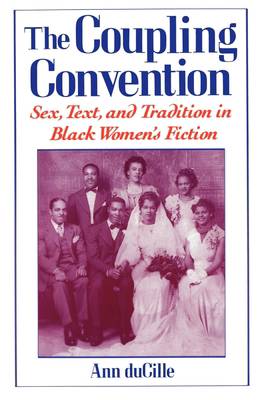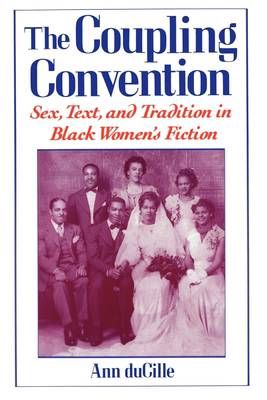
Bedankt voor het vertrouwen het afgelopen jaar! Om jou te bedanken bieden we GRATIS verzending (in België) aan op alles gedurende de hele maand januari.
- Afhalen na 1 uur in een winkel met voorraad
- Gratis thuislevering in België vanaf € 30
- Ruim aanbod met 7 miljoen producten
Bedankt voor het vertrouwen het afgelopen jaar! Om jou te bedanken bieden we GRATIS verzending (in België) aan op alles gedurende de hele maand januari.
- Afhalen na 1 uur in een winkel met voorraad
- Gratis thuislevering in België vanaf € 30
- Ruim aanbod met 7 miljoen producten
Zoeken
The Coupling Convention
Sex, Text, and Tradition in Black Women's Fiction
Ann Ducille
Paperback | Engels
€ 72,95
+ 145 punten
Omschrijving
What does the tradition of marriage mean for people who have historically been deprived of its legal status? Generally thought of as a convention of the white middle class, the marriage plot has received little attention from critics of African-American literature. In this study, Ann duCille uses texts such as Nella Larsen's Quicksand (1928) and Zora Neale Hurston's Their Eyes Were Watching God (1937) to demonstrate that the African-American novel, like its European and Anglo-American counterparts, has developed around the marriage plot--what she calls "the coupling convention." Exploring the relationship between racial ideology and literary and social conventions, duCille uses the coupling convention to trace the historical development of the African-American women's novel. She demonstrates the ways in which black women appropriated this novelistic device as a means of expressing and reclaiming their own identity. More than just a study of the marriage tradition in black women's fiction, however, The Coupling Convention takes up and takes on many different meanings of tradition. It challenges the notion of a single black literary tradition, or of a single black feminist literary canon grounded in specifically black female language and experience, as it explores the ways in which white and black, male and female, mainstream and marginalized "traditions" and canons have influenced and cross-fertilized each other. Much more than a period study, The Coupling Convention spans the period from 1853 to 1948, addressing the vital questions of gender, subjectivity, race, and the canon that inform literary study today. In this original work, duCille offers a new paradigm for reading black women's fiction.
Specificaties
Betrokkenen
- Auteur(s):
- Uitgeverij:
Inhoud
- Aantal bladzijden:
- 216
- Taal:
- Engels
Eigenschappen
- Productcode (EAN):
- 9780195085099
- Verschijningsdatum:
- 25/11/1993
- Uitvoering:
- Paperback
- Formaat:
- Trade paperback (VS)
- Afmetingen:
- 154 mm x 235 mm
- Gewicht:
- 308 g

Alleen bij Standaard Boekhandel
+ 145 punten op je klantenkaart van Standaard Boekhandel
Beoordelingen
We publiceren alleen reviews die voldoen aan de voorwaarden voor reviews. Bekijk onze voorwaarden voor reviews.









